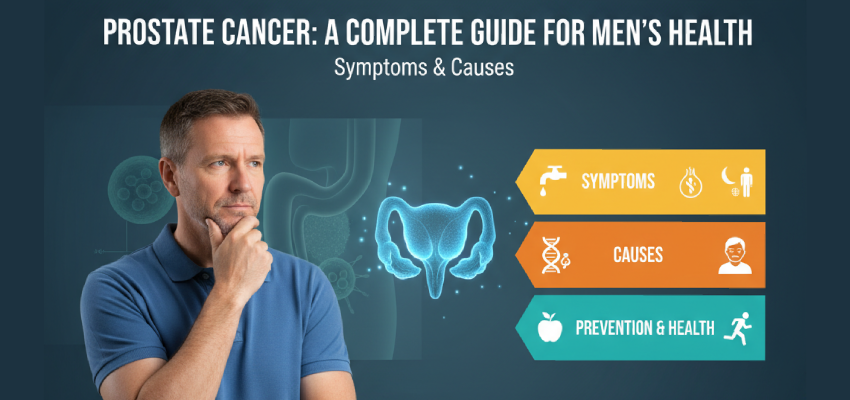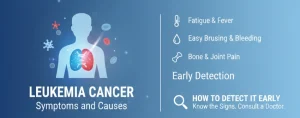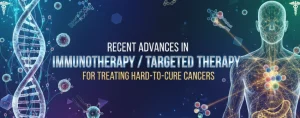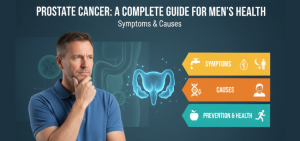Prostate cancer is one of the most common cancers affecting men worldwide. It develops slowly in most cases, often without noticeable symptoms in the early stages, which makes awareness and regular health checks essential. Detecting the disease early can make treatment more effective and improve long-term outcomes.
At Venkateshwar Hospitals, our oncology experts are dedicated to guiding men through every step of awareness, prevention and treatment. This guide explains the symptoms and causes of prostate cancer while highlighting the importance of timely medical care for men’s health.
Understanding Prostate Cancer
The prostate is a small gland located below the bladder and in front of the rectum. Its primary role is to produce fluid that nourishes and transports sperm.
Prostate cancer occurs when cells in the prostate grow uncontrollably, forming a tumour. While some tumours remain slow-growing and confined to the gland, if it progresses may spread to bones and nearby tissues, making them more dangerous.
Awareness is vital because many men do not realise they have prostate cancer until symptoms become severe. Early detection allows for timely treatment and can significantly improve recovery chances.
Prostate Cancer Symptoms
Prostate cancer symptoms can vary depending on whether the disease is in its early or advanced stages. Being aware of these signs can prompt men to seek medical advice before complications develop.
Early-Stage Symptoms
In its initial phase, prostate cancer may not show any obvious symptoms. When signs do appear, they are often related to changes in urinary habits, such as:
- Frequent urination: Especially noticeable at night, this occurs when the enlarged prostate presses against the bladder.
- Weak or interrupted urine flow: Difficulty maintaining a steady stream of urine can indicate obstruction.
- Difficulty starting urination: Men may struggle to begin urinating or feel unable to empty the bladder completely.
These symptoms are not exclusive to cancer and may also be linked to benign prostate enlargement. However, medical evaluation is necessary to rule out serious causes.
Advanced Symptoms
As the disease progresses, more noticeable and troubling symptoms may arise:
- Blood in urine or semen: The presence of blood may indicate advanced changes in the prostate.
- Erectile dysfunction: Difficulty maintaining erections can occur as cancer affects surrounding nerves and tissues.
- Pain in hips, back or pelvis: When cancer spreads, it may cause persistent pain in bones and joints.
When to See a Doctor
Any man experiencing urinary changes, blood in urine or semen, or persistent pelvic pain should consult a doctor without delay. At Venkateshwar Hospitals, our specialists provide thorough evaluations and use advanced tests to ensure accurate diagnosis and timely treatment.
Prostate Cancer Causes
The causes of prostate cancer are complex and often involve a combination of genetic, environmental and lifestyle factors.
Genetic Factors
- Family history: Men with a father or brother diagnosed with prostate cancer have a higher risk.
- Inherited mutations: Mutations in certain genes, such as BRCA1 and BRCA2, can predispose men to prostate cancer.
Lifestyle and Environmental Factors
- Diet: A diet high in red meat and dairy products, with low intake of fruits and vegetables, may increase risk.
- Smoking and obesity: Both contribute to poor overall health and raise the likelihood of developing prostate cancer.
- Lack of exercise: Sedentary lifestyles are associated with higher risk and worse outcomes.
Age and Hormonal Factors
- Risk after age 50: The likelihood of developing prostate cancer increases significantly with age.
- Hormonal changes: High levels of testosterone and other hormones may play a role in disease progression.
Other Possible Causes
- Chronic inflammation: Ongoing prostate inflammation, known as prostatitis, may increase risk.
Also Read – Cancer In Man, Which Is The Most Common And How Is It Treated?
Risk Factors for Prostate Cancer
Certain factors further increase vulnerability:
- Age and ethnicity: Men over 50 and those of African ancestry face higher risks.
- Family history: A strong family history of prostate or other cancers heightens susceptibility.
- Unhealthy lifestyle: Diets high in fat, smoking and lack of exercise contribute to risk.
Importance of Early Detection
Prostate cancer is more treatable when detected early. Screening tools include:
- PSA test: The Prostate-Specific Antigen test measures levels of a protein in the blood. High levels may indicate cancer or other prostate conditions.
- Digital rectal examination (DRE): A doctor examines the prostate for irregularities.
Early detection allows doctors to recommend less invasive treatments, improves survival rates and reduces complications.
How Venkateshwar Hospitals Can Help
Venkateshwar Hospitals offers comprehensive care for prostate health:
- Advanced diagnostics: PSA testing, imaging and biopsy facilities for accurate detection.
- Expert specialists: A multidisciplinary oncology team with expertise in prostate cancer.
- Patient-centric care: Personalised treatment plans, counseling and supportive therapies to ensure holistic care.
Prevention and Lifestyle Tips
Men can reduce their risk of prostate cancer through lifestyle choices:
- Healthy diet: A balanced diet rich in fruits, vegetables and low-fat foods supports prostate health.
- Regular physical activity: Exercise helps maintain healthy weight and reduces risk.
- Avoid smoking and alcohol: Eliminating tobacco and limiting alcohol intake promote overall wellness.
- Routine check-ups: Regular screenings help detect abnormalities before they progress.
Conclusion
Prostate cancer is a significant health issue for men, but with awareness, preventive care and early detection, outcomes can be greatly improved. Understanding the symptoms and causes empowers men to take proactive steps for their health.
If you or a loved one notice symptoms or have concerns about prostate health, consult our specialists at Venkateshwar Hospitals for expert guidance and advanced treatment.
Frequently Asked Questions
1. What are the first signs of prostate cancer?
Frequent urination, difficulty starting urination and weak urine flow are common early signs.
2. At what age should men get screened for prostate cancer?
Screening is generally recommended from age 50, or earlier for men at higher risk.
3. Can lifestyle changes reduce the risk of prostate cancer?
Yes, a healthy diet, regular exercise and avoiding smoking lower the risk.
4. Is prostate cancer hereditary?
A family history increases the likelihood of developing the disease.
5. What are the common causes of prostate cancer?
Genetics, ageing, poor diet, smoking and hormonal factors all contribute.
6. Can prostate cancer be detected early through routine check-ups?
Yes, PSA tests and digital rectal exams help detect prostate cancer in its early stages.
7. What foods help prevent prostate cancer?
Diets rich in tomatoes, green vegetables, fish and whole grains are beneficial.
8. Are urinary problems always a sign of prostate cancer?
No, they can also be caused by benign prostate enlargement or infections, but evaluation is essential.
9. What is the difference between benign prostate enlargement and prostate cancer?
Benign enlargement is non-cancerous, while prostate cancer involves uncontrolled cell growth with potential to spread.
10. How does Venkateshwar Hospitals support prostate cancer patients?
Through advanced diagnostics, expert oncologists and patient-focused care tailored to individual needs.












